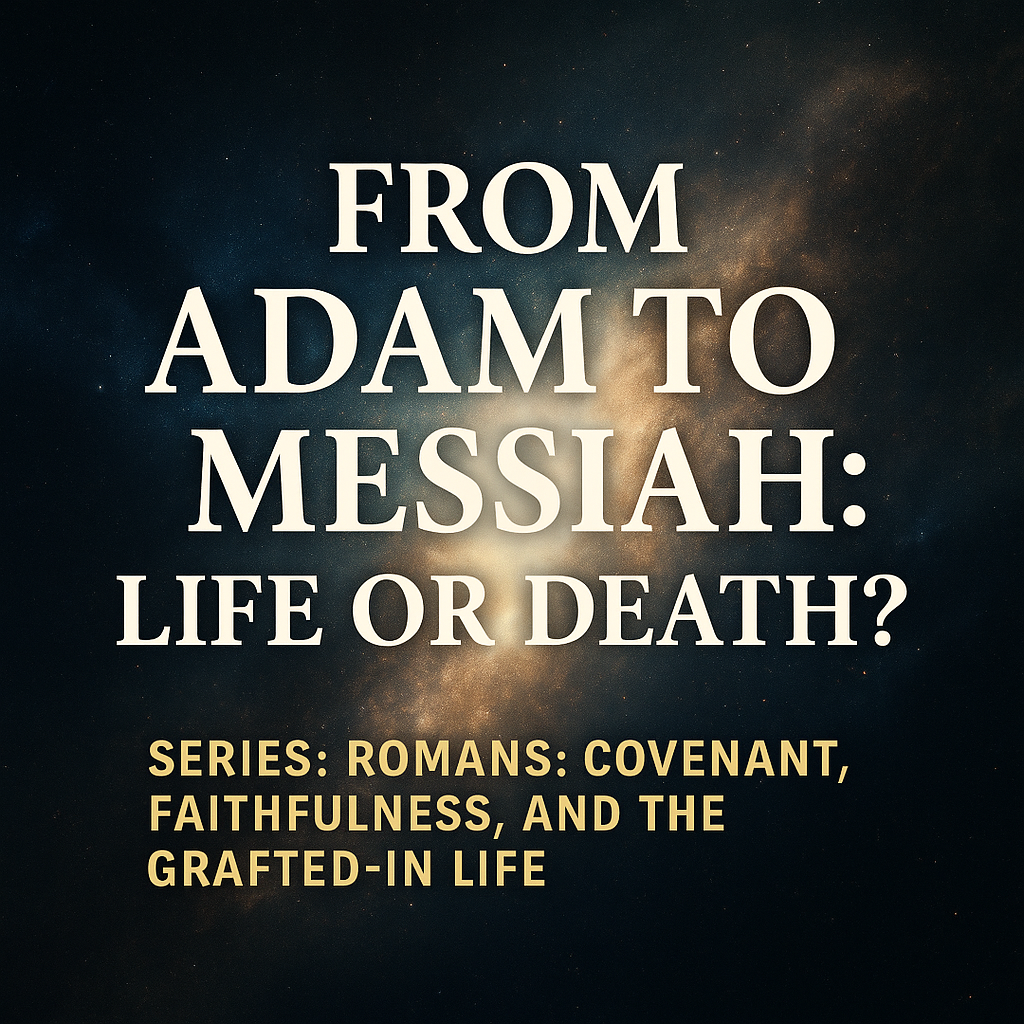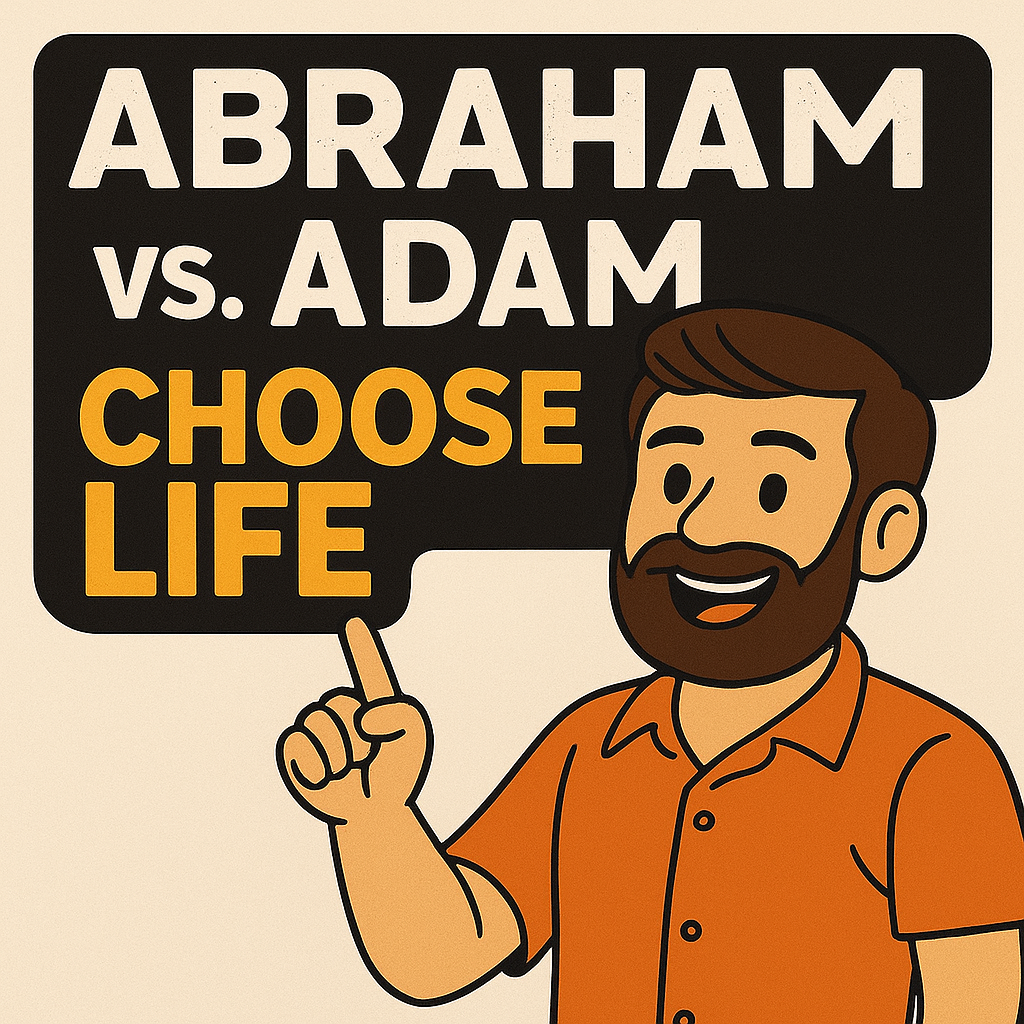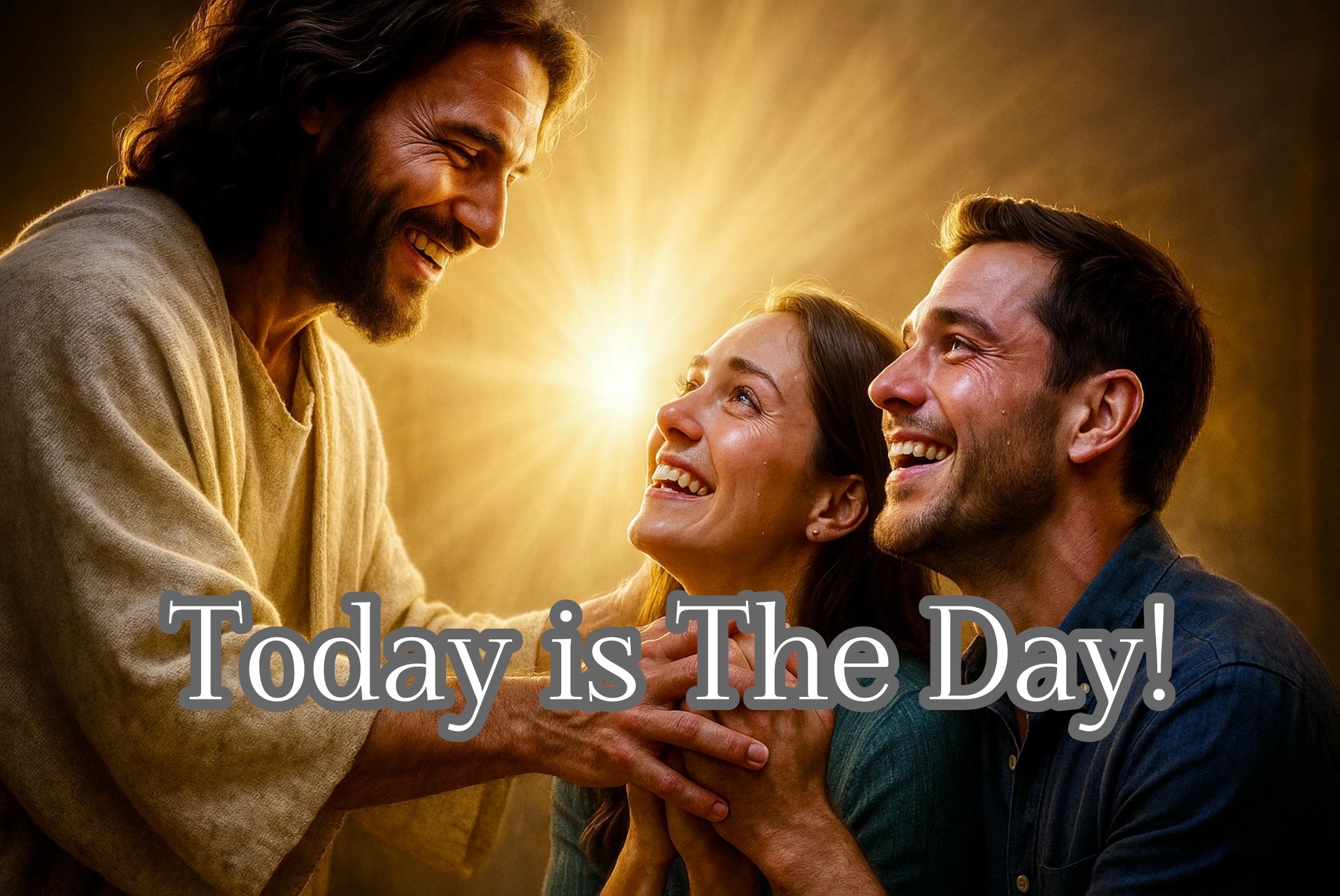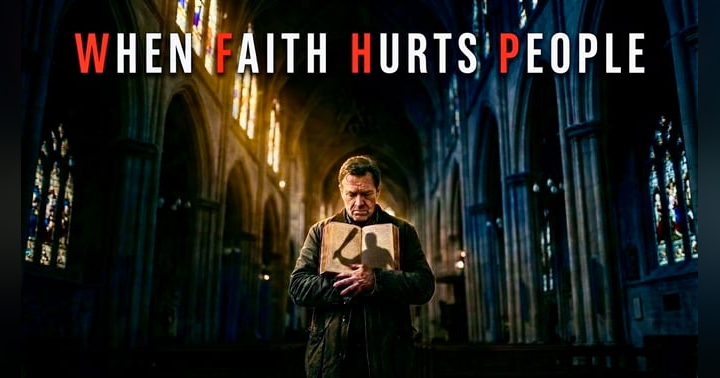What Does Romans 5 REALLY Teach About Adam, Messiah, and the Choice Between Life or Death?
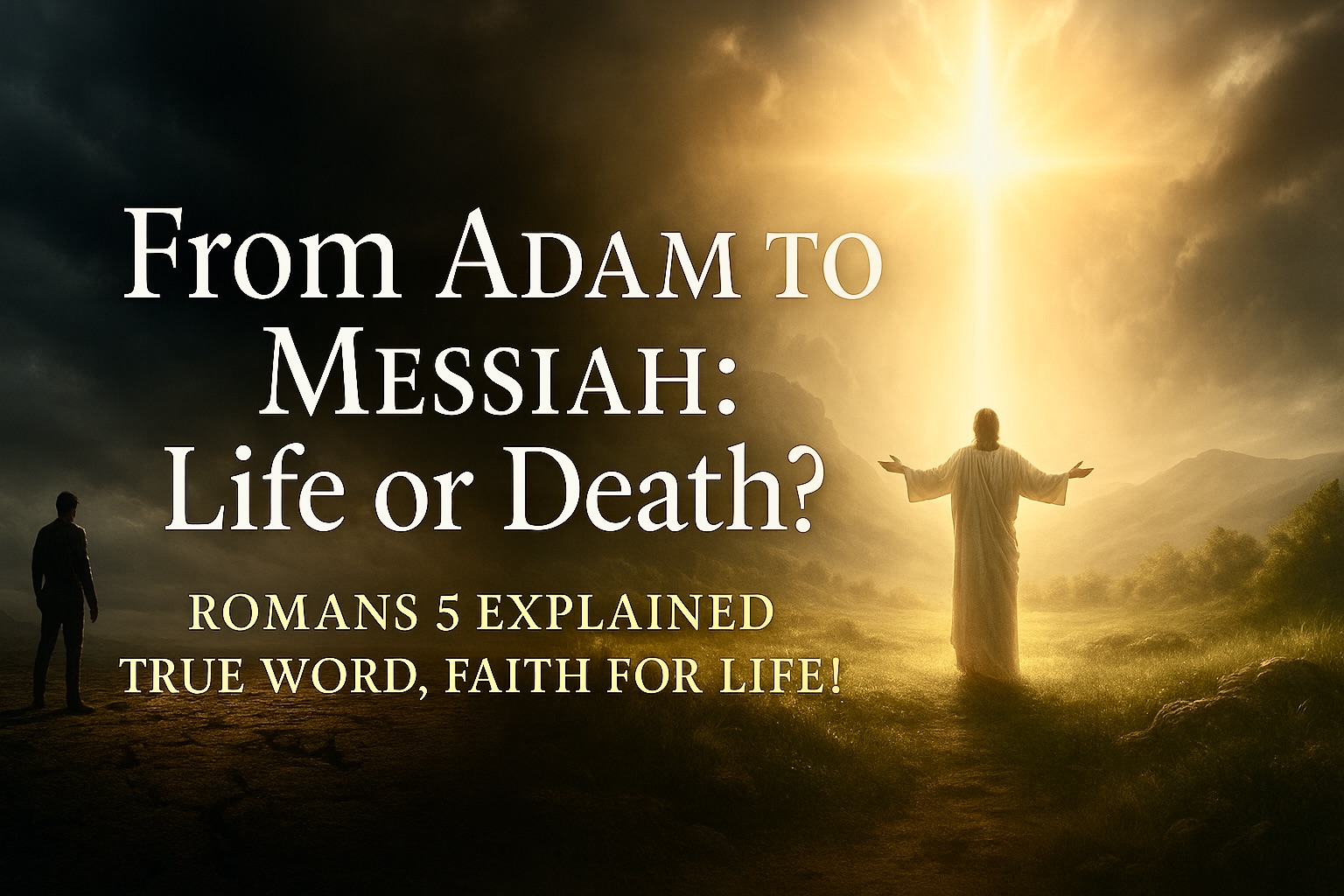
What Does Romans 5 REALLY Teach About Life and Death?
From Adam to Messiah: Life or Death?
Series: Romans: Covenant, Faithfulness, and the Grafted-In Life
WATCH on RUMBLE!
WATCH on YouTube!
What if all of human history could be told as the story of just two men, Adam and Messiah?
Romans 5 reveals that our destiny and our identity hinge on which of these two we belong to.
One man’s disobedience unleashed death and decay into the world; the other’s obedience opened the gates of grace and eternal life.
But this is not abstract theology. It is the most personal truth you will ever face. You are living as a son of Adam or as a new creation in Messiah.
Romans 5 — Side-by-Side Comparison: LEB & CJB
Lexham English Bible (LEB) | Complete Jewish Bible (CJB) |
|---|---|
1. Therefore, because we have been declared righteous by faith, we have peace with God through our Lord Jesus Christ, | 1. So, since we have come to be considered righteous by God because of our trust, let us continue to have shalom with God through our Lord Yeshua the Messiah. |
2. through whom also we have obtained access by faith into this grace in which we stand, and we boast in the hope of the glory of God. | 2. Also through him and on the ground of our trust, we have gained access to this grace in which we stand; so let us boast about the hope of experiencing God’s glory. |
3. And not only this, but we also boast in our afflictions, because we know that affliction produces patient endurance, | 3. But not only that, let us also boast in our troubles; because we know that trouble produces endurance, |
4. and patient endurance, proven character, and proven character, hope, | 4. endurance produces perseverance; and perseverance produces proven character; and proven character produces hope. |
5. and hope does not disappoint, because the love of God has been poured out in our hearts through the Holy Spirit who was given to us. | 5. And this hope does not let us down, because God’s love for us has already been poured out in our hearts through the Ruach HaKodesh who has been given to us. |
6. For while we were still helpless, yet at the proper time Christ died for the ungodly. | 6. For while we were still helpless, at the right time, the Messiah died on behalf of ungodly people. |
7. For only rarely will someone die on behalf of a righteous person, though on behalf of a good person perhaps someone might even dare to die. | 7. Now it is a rare event when someone gives up his life even for the sake of somebody who is righteous, although possibly for a truly good person one might have the courage to die. |
8. But God demonstrates his own love for us, in that while we were still sinners, Christ died for us. | 8. But God demonstrates his own love for us in that the Messiah died on our behalf while we were still sinners. |
9. Therefore, by much more, because we have been declared righteous now by his blood, we will be saved through him from the wrath. | 9. Therefore, since we have now come to be considered righteous by means of his bloody sacrificial death, how much more will we be delivered through him from the anger of God’s judgment! |
10. For if, while we were enemies, we were reconciled to God through the death of his Son, by much more, having been reconciled, we will be saved by his life. | 10. For if we were reconciled with God through his Son’s death when we were enemies, how much more will we be delivered by his life, now that we are reconciled! |
11. And not only this, but also we are boasting in God through our Lord Jesus Christ, through whom we have now received the reconciliation. | 11. And not only will we be delivered in the future, but we are boasting about God right now, because he has acted through our Lord Yeshua the Messiah, through whom we have already received that reconciliation. |
12. Because of this, just as through one man sin entered into the world, and death through sin, and thus death spread to all people, because all sinned— | 12. Here is how it works: It was through one individual that sin entered the world, and through sin, death; and in this way death passed through to the whole human race, inasmuch as everyone sinned. |
13. for until the law, sin was in the world, but sin is not charged to one’s account when there is no law. | 13. Sin was indeed present in the world before Torah was given, but sin is not counted as such when there is no Torah. |
14. But death reigned from Adam until Moses, even over those who did not sin in the likeness of the transgression of Adam, who is a type of the one who is to come. | 14. Nevertheless, death ruled from Adam until Moshe, even over those whose sinning was not exactly like Adam’s violation of a direct command. In this, Adam prefigured the One who was to come. |
15. But the gift is not like the trespass, for if by the trespass of the one the many died, by much more did the grace of God and the gift by the grace of the one man Jesus Christ multiply to the many. | 15. But the free gift is not like the offense. For if, because of one man’s offense, many died, then how much more has God’s grace, that is, the gracious gift of one man, Yeshua the Messiah, overflowed to many! |
16. And the gift is not as through the one who sinned; for judgment from one sin resulted in condemnation, but the gracious gift from many trespasses resulted in justification. | 16. No, the free gift is not like what resulted from one man’s sinning. For from one sinner came judgment that brought condemnation; but the free gift came after many offenses and brought acquittal. |
17. For if by the trespass of the one, death reigned through the one, by much more will those who receive the abundance of grace and of the gift of righteousness reign in life through the one, Jesus Christ. | 17. For if, because of the offense of one man, death ruled through that one man, how much more will those receiving the overflowing grace, that is, the gift of being considered righteous, rule in life through the one man, Yeshua the Messiah! |
18. Consequently, therefore, as through one trespass came condemnation for all people, so also through one righteous act came justification of life for all people. | 18. In other words, just as it was through one offense that all people came under condemnation, so also it is through one righteous act that all people come to be considered righteous. |
19. For just as through the disobedience of the one man the many were made sinners, so also through the obedience of the one the many will be made righteous. | 19. For just as through the disobedience of one man many were made sinners, so also through the obedience of one man many will be made righteous. |
20. Now the law came in as a side issue, in order that the trespass could increase; but where sin increased, grace increased all the more, | 20. And the Torah came into the picture so that the offense would proliferate. But where sin proliferated, grace proliferated even more! |
21. so that just as sin reigned in death, so also grace would reign through righteousness to eternal life through Jesus Christ our Lord. | 21. All this happened so that, just as sin ruled by means of death, so also grace might rule by means of causing people to be considered righteous, so that they might have eternal life, through Yeshua the Messiah, our Lord. |
Key Hebraic Observations
CJB restores Hebraic texture: Translating pistis as trust and dikaiosynē as “being considered righteous” connects Paul’s Greek rhetoric to his Hebrew worldview of emunah and tzedakah.
“Torah” vs. “Law”: The CJB clarifies Paul’s meaning — not legalism, but covenant instruction.
“Reigned” and “Ruled” imagery: Both versions depict dominion language echoing Genesis — sin and death rule, grace and life reign, showing covenant reversal.
CJB’s dynamic phrases (“proliferate,” “trust,” “grace overflowed”) capture Paul’s Hebrew rhythm and emotion.
“Yeshua the Messiah” re-anchors Paul’s writing in his Jewish context, reminding the reader that this is covenant restoration, not a new religion.
The First Adam: The Beginning of the End
When Paul wrote, “Through one man sin entered the world, and death through sin,” he was not giving us a metaphor.
He was describing a covenant rupture.
The Hebrew word adam (ah-dahm) means “humanity.” Adam was not only a man but the representative head of all people. His rebellion in Eden was a declaration of independence from the Creator. He abandoned the covenant calling to serve and guard the garden (avad [ah-vahd] and shamar [shah-mar]), and as a result, exile came.
From that moment, humanity began living east of Eden, carrying the curse of self-rule. Sin was no longer an act; it was a nature.
The Second Adam: The Beginning of Restoration
Then came Yeshua (yeh-SHOO-ah), the true and faithful Son. Where Adam reached for equality with God, Yeshua humbled Himself. Where Adam hid in shame, Yeshua stepped into public humiliation and death.
Paul’s repeated phrase “much more” in Romans 5 is not poetic exaggeration. It is a declaration of victory. Much more has grace abounded. Much more has life triumphed. Much more does righteousness reign.
Messiah’s obedience does not merely reverse Adam’s fall; it overflows beyond it. The cross does not simply erase sin; it inaugurates a new creation.
Shalom Restored
Romans 5:1 says, “Since we have been justified by faith, we have peace with God through our Lord Yeshua the Messiah.”
That word peace in Hebrew is shalom (shah-lohm), and it means wholeness. It is when everything in creation is put back where it belongs. It is when your heart is no longer at war with your Creator.
Dr. Skip Moen notes that shalom is not about calm circumstances; it is about restored purpose. It is the divine order reestablished in your soul.
Grace That Reigns
Paul ends Romans 5 with this: “Where sin increased, grace abounded all the more.”
In Hebrew, chen (khayn) means grace or favor. It is God’s freely given power to walk rightly, not merely permission to fail. Grace reigns through righteousness, not apart from it.
We are no longer slaves to Adam’s legacy. We are citizens of Messiah’s kingdom.
Taco Tony’s Kitchen Table Theology
My good friend Taco Tony once said over coffee, “Doc, it sounds like Adam’s recipe brought death to the kitchen, but Yeshua came in with the recipe for life.”
Exactly. Adam’s cookbook burns everything it touches. Messiah’s recipe restores what was ruined.
Tony grinned and said, “Guess it’s time to change what I’m cooking.”
Yes, Tony. And that’s the point for all of us. Change the recipe.
The Challenge and the Choice
Romans 5 gives us no neutral ground. You are either in Adam or in Messiah.
Adam’s rebellion leads to separation, decay, and death. Messiah’s obedience leads to restoration, grace, and life.
Deuteronomy 30:19 echoes through Paul’s letter: “I have set before you life and death, blessing and curse. Choose life.”
Choose covenant. Choose obedience. Choose Yeshua.
Prayer of Salvation
Heavenly Father, I come to You today with an open and humble heart. I know that I have sinned and fallen short of Your glory, and I am asking for Your forgiveness.
Right now, I turn away from my sins and turn fully toward You.
I believe that Jesus, Your Son, is the promised Messiah, that He died for my sins, was buried, and rose again on the third day just as the Bible says. Today I call on Your holy Name. Please forgive me, cleanse me, and make me new. Fill me with Your Holy Spirit and write Your truth on my heart. From this day forward, I choose to follow Jesus as my Lord, my Redeemer, and my King.
Thank You for loving me, for saving me, and for making me part of Your family forever. In the name of Jesus Christ, the King of Kings, I pray. Amen.
If you prayed that prayer, I want to welcome you into the family of God.
Contact me directly at TrueWordFaithforLife.com and I will personally help you take your first steps as a follower of Jesus. You are not alone.
Adam’s failure explains why the world is broken.
Messiah’s faithfulness explains why there is still hope.
Two men. Two paths. Two destinies.
ChooseThe One whose blood speaks better things than Abel’s.
Choose life. Choose Yeshua.
Shalom b’Shem Yeshua.
© 2025 Dr. Shawn M. Greener. All Rights Reserved.
True Word, Faith for LIFE!
📖 STUDY GUIDE
Romans 5 — From Adam to Messiah: Life or Death
Series: Romans: Covenant, Faithfulness, and the Grafted-In Life
Romans 5 — Side-by-Side Comparison: LEB & CJB
Lexham English Bible (LEB) | Complete Jewish Bible (CJB) |
|---|---|
1. Therefore, because we have been declared righteous by faith, we have peace with God through our Lord Jesus Christ, | 1. So, since we have come to be considered righteous by God because of our trust, let us continue to have shalom with God through our Lord Yeshua the Messiah. |
2. through whom also we have obtained access by faith into this grace in which we stand, and we boast in the hope of the glory of God. | 2. Also through him and on the ground of our trust, we have gained access to this grace in which we stand; so let us boast about the hope of experiencing God’s glory. |
3. And not only this, but we also boast in our afflictions, because we know that affliction produces patient endurance, | 3. But not only that, let us also boast in our troubles; because we know that trouble produces endurance, |
4. and patient endurance, proven character, and proven character, hope, | 4. endurance produces perseverance; and perseverance produces proven character; and proven character produces hope. |
5. and hope does not disappoint, because the love of God has been poured out in our hearts through the Holy Spirit who was given to us. | 5. And this hope does not let us down, because God’s love for us has already been poured out in our hearts through the Ruach HaKodesh who has been given to us. |
6. For while we were still helpless, yet at the proper time Christ died for the ungodly. | 6. For while we were still helpless, at the right time, the Messiah died on behalf of ungodly people. |
7. For only rarely will someone die on behalf of a righteous person, though on behalf of a good person perhaps someone might even dare to die. | 7. Now it is a rare event when someone gives up his life even for the sake of somebody who is righteous, although possibly for a truly good person one might have the courage to die. |
8. But God demonstrates his own love for us, in that while we were still sinners, Christ died for us. | 8. But God demonstrates his own love for us in that the Messiah died on our behalf while we were still sinners. |
9. Therefore, by much more, because we have been declared righteous now by his blood, we will be saved through him from the wrath. | 9. Therefore, since we have now come to be considered righteous by means of his bloody sacrificial death, how much more will we be delivered through him from the anger of God’s judgment! |
10. For if, while we were enemies, we were reconciled to God through the death of his Son, by much more, having been reconciled, we will be saved by his life. | 10. For if we were reconciled with God through his Son’s death when we were enemies, how much more will we be delivered by his life, now that we are reconciled! |
11. And not only this, but also we are boasting in God through our Lord Jesus Christ, through whom we have now received the reconciliation. | 11. And not only will we be delivered in the future, but we are boasting about God right now, because he has acted through our Lord Yeshua the Messiah, through whom we have already received that reconciliation. |
12. Because of this, just as through one man sin entered into the world, and death through sin, and thus death spread to all people, because all sinned— | 12. Here is how it works: It was through one individual that sin entered the world, and through sin, death; and in this way death passed through to the whole human race, inasmuch as everyone sinned. |
13. for until the law, sin was in the world, but sin is not charged to one’s account when there is no law. | 13. Sin was indeed present in the world before Torah was given, but sin is not counted as such when there is no Torah. |
14. But death reigned from Adam until Moses, even over those who did not sin in the likeness of the transgression of Adam, who is a type of the one who is to come. | 14. Nevertheless, death ruled from Adam until Moshe, even over those whose sinning was not exactly like Adam’s violation of a direct command. In this, Adam prefigured the One who was to come. |
15. But the gift is not like the trespass, for if by the trespass of the one the many died, by much more did the grace of God and the gift by the grace of the one man Jesus Christ multiply to the many. | 15. But the free gift is not like the offense. For if, because of one man’s offense, many died, then how much more has God’s grace, that is, the gracious gift of one man, Yeshua the Messiah, overflowed to many! |
16. And the gift is not as through the one who sinned; for judgment from one sin resulted in condemnation, but the gracious gift from many trespasses resulted in justification. | 16. No, the free gift is not like what resulted from one man’s sinning. For from one sinner came judgment that brought condemnation; but the free gift came after many offenses and brought acquittal. |
17. For if by the trespass of the one, death reigned through the one, by much more will those who receive the abundance of grace and of the gift of righteousness reign in life through the one, Jesus Christ. | 17. For if, because of the offense of one man, death ruled through that one man, how much more will those receiving the overflowing grace, that is, the gift of being considered righteous, rule in life through the one man, Yeshua the Messiah! |
18. Consequently, therefore, as through one trespass came condemnation for all people, so also through one righteous act came justification of life for all people. | 18. In other words, just as it was through one offense that all people came under condemnation, so also it is through one righteous act that all people come to be considered righteous. |
19. For just as through the disobedience of the one man the many were made sinners, so also through the obedience of the one the many will be made righteous. | 19. For just as through the disobedience of one man many were made sinners, so also through the obedience of one man many will be made righteous. |
20. Now the law came in as a side issue, in order that the trespass could increase; but where sin increased, grace increased all the more, | 20. And the Torah came into the picture so that the offense would proliferate. But where sin proliferated, grace proliferated even more! |
21. so that just as sin reigned in death, so also grace would reign through righteousness to eternal life through Jesus Christ our Lord. | 21. All this happened so that, just as sin ruled by means of death, so also grace might rule by means of causing people to be considered righteous, so that they might have eternal life, through Yeshua the Messiah, our Lord. |
I. Summary
Romans 5 contrasts two representative figures: Adam and Messiah. Through Adam’s disobedience, sin and death entered creation. Through Yeshua’s obedience, righteousness and life were restored.
Paul’s argument reveals the covenantal framework of redemption—humanity’s fall and restoration both hinge on covenant heads. Justification by faith brings shalom (shah-lohm) with God, and that peace is not mere emotion but restored wholeness.
Suffering, Paul teaches, is not meaningless. It produces endurance, character, and hope. God’s love, chesed (kheh-sed), is demonstrated not when we earned it, but while we were yet sinners. The Torah magnified human sinfulness, but grace (chen (khayn)) overflowed even more abundantly.
Ultimately, Romans 5 calls every believer to recognize the two kingdoms at work: the dominion of death under Adam, and the reign of grace under Messiah. Every life belongs to one or the other.
II. Key Hebrew and Greek Terms
Term | Pronunciation | Meaning | Context |
Dikaioō | (dee-kah-ee-oh-oh) | To declare righteous in covenant relationship | Describes justification through Messiah |
Shalom | (shah-lohm) | Wholeness, completeness, restored order | The result of justification |
Tsarah | (tsah-rah) | Affliction or distress | Describes suffering that refines faith |
Chesed | (kheh-sed) | Loyal covenant love in action | God’s love that moves first |
Adam | (ah-dahm) | Humanity or man | Representative of fallen mankind |
Avad | (ah-vahd) | To serve | Adam’s role in Eden |
Shamar | (shah-mar) | To guard or keep | Adam’s priestly duty |
Chen | (khayn) | Grace or favor | Divine empowerment to live righteously |
Emunah | (eh-moo-nah) | Faithfulness or steadfast trust | The believer’s proper covenant response |
III. Discussion Questions
1. How does Paul’s comparison of Adam and Messiah reveal the covenantal nature of salvation rather than a merely individual transaction?
2. What does it mean that “peace with God” is shalom (shah-lohm) rather than just absence of hostility?
3. How does viewing suffering as tsarah (tsah-rah)—refinement rather than punishment—reshape your understanding of trials?
4. In what ways does God’s chesed (kheh-sed) challenge our culture’s emotional definition of love?
5. Paul says that “grace reigns through righteousness.” How does this differ from modern misunderstandings of grace as license?
6. When you examine your life, can you identify areas where Adam’s legacy still influences your choices? How might Messiah’s example transform those areas?
7. How do these two “Adams” help us understand the role of Yeshua as both Redeemer and representative of a new humanity?
IV. Practical Application
•Identity: Recognize that your ultimate identity flows from your covenant head. In Adam, sin defines you. In Messiah, righteousness defines you.
•Endurance: Trials are not curses. They are opportunities to prove covenant faithfulness and to grow in endurance and character.
•Grace and Discipline: Grace does not nullify obedience; it empowers it. Living “under grace” means living as a citizen of Messiah’s kingdom.
•Loyal Love: Reflect God’s chesed (kheh-sed) by loving others in tangible, loyal, and sacrificial ways.
•Witness: When you live from the reign of grace, your life becomes a living contrast between the two humanities—an invitation for others to step into life.
V. Reflection Exercise
Take time this week to read Romans 5 aloud in the Lexham English Bible (LEB).
Write down every contrast you see between Adam and Messiah.
Then ask: In which areas of my life is Adam still speaking, and where is Messiah reigning?
Pray for grace (chen (khayn)) to let the second Adam define your daily walk.
VI. Footnotes
1.Michael S. Heiser, The Unseen Realm: Recovering the Supernatural Worldview of the Bible (Bellingham, WA: Lexham Press, 2015), 109–113.
2.Skip Moen, Spiritual Restoration: Volume 1, Returning to the Roots of Our Faith (Orlando, FL: At God’s Table, 2011), 54–59.
3.N. T. Wright, Paul and the Faithfulness of God (Minneapolis, MN: Fortress Press, 2013), 568–570.
4.Complete Jewish Study Bible (Peabody, MA: Hendrickson Publishers, 2016), Romans 5 commentary.
5.Lexham English Bible, Romans 5:1–21.
VII. Bibliography
•Heiser, Michael S. The Unseen Realm: Recovering the Supernatural Worldview of the Bible. Bellingham, WA: Lexham Press, 2015.
•Moen, Skip. Spiritual Restoration: Returning to the Roots of Our Faith. Orlando, FL: At God’s Table, 2011.
•Wright, N. T. Paul and the Faithfulness of God. Minneapolis, MN: Fortress Press, 2013.
•The Complete Jewish Study Bible. Peabody, MA: Hendrickson Publishers, 2016.
•The Lexham English Bible. Bellingham, WA: Lexham Press, 2012.
True Word Faith for LIFE, Dr Shawn M Greener, Romans 5 explained, Adam and Messiah, Second Adam Jesus, Romans 5 Bible study, What does Romans 5 mean, justification by faith Romans, peace with God, shalom, chesed, chen, Hebrew roots teaching, Ancient Near Eastern context, grace through righteousness, covenant faithfulness, Yeshua HaMashiach, biblical discipleship, Hebraic worldview, Christian teaching, Bible exposition, Romans series
#TrueWordFaithForLife #DrShawnGreener #Romans5 #AdamAndMessiah #ChooseLife #HebraicFaith #CovenantTheology #BibleStudy #MessiahYeshua #GraceAndTruth #FaithForLife #RomansExplained #BiblicalTeaching #FollowerOfTheWay #YeshuaHaMashiach
